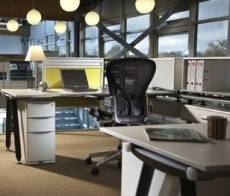June 26, 2014
The debate about open plan offices is not helped by its use of stereotypes
 The incessant debate about open plan offices is informed by a number of assumptions that can lead us to misunderstand the issues involved. Nigel Oseland eviscerates several of them excellently here, making it plain that a great deal is lost in translation somewhere over the mid-Atlantic. In truth, the European and US experiences of the open plan are very different and while we in the UK could always laugh along with our US counterparts at the organisational insanity of Dilbert, the cubicles themselves were largely alien to us. Another red herring in the debate is the idea that the open plan office is for extroverts and its alternatives for introverts. There is something in this but it’s too simplistic an idea and is often built around the stereotypes associated with sectors such as TMT, the age of workers (especially Gen Y) and supposed national characteristics, not least the reserve of Brits and the brashness of Yanks.
The incessant debate about open plan offices is informed by a number of assumptions that can lead us to misunderstand the issues involved. Nigel Oseland eviscerates several of them excellently here, making it plain that a great deal is lost in translation somewhere over the mid-Atlantic. In truth, the European and US experiences of the open plan are very different and while we in the UK could always laugh along with our US counterparts at the organisational insanity of Dilbert, the cubicles themselves were largely alien to us. Another red herring in the debate is the idea that the open plan office is for extroverts and its alternatives for introverts. There is something in this but it’s too simplistic an idea and is often built around the stereotypes associated with sectors such as TMT, the age of workers (especially Gen Y) and supposed national characteristics, not least the reserve of Brits and the brashness of Yanks.

























June 27, 2014
Government must solve problem of London’s wasted commercial property
by Paul Statham • Comment, Facilities management, Property
(more…)